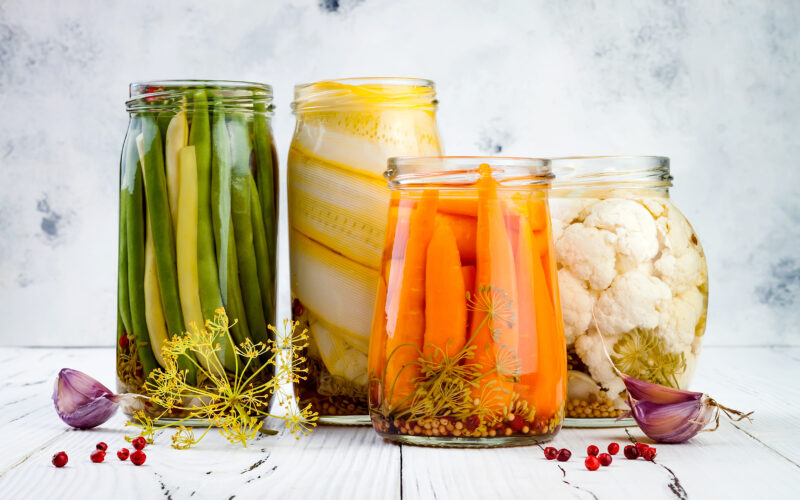After being diagnosed with polycystic ovary syndrome (PCOS), a hormonal disorder that can cause irregular periods and infertility, I decided to do a deep-dive into how the things I ate could help or hurt my health. With my husband, I embarked upon the Autoimmune Protocol (AIP) diet, which not only recommends temporarily eliminating certain inflammatory foods, but also suggests including more fermented foods into one’s diet. “Why the inclusion of fermented foods?” you might be wondering. “After all, what can kimchi do for my health, let alone my painful periods?” As it turns out, possibly a lot! As we’ll discuss in this article, recent research has shown that the beneficial bacteria, or probiotics, found in fermented foods may have an especially helpful effect for those who suffer from PCOS.
Discovering the root cause(s) of PCOS
PCOS affects one in ten women of childbearing age. Yet, we have much to learn about why this condition affects so many. The final report of a 2012 NIH methodology workshop concluded that the underlying physiological causes of PCOS are “not fully determined.” As such, they recommended that future studies investigate the genetic or epigenetic causes of PCOS and the mechanisms by which it alters ovarian, adrenal, and metabolic function. This would enable doctors to treat the root causes of the condition, rather than masking symptoms using birth control.
One result of that call for research is a growing body of studies theorizing that PCOS is tied to dysbiosis: imbalances in the gut microbiome that can lead to inflammation and insulin resistance (both of which are associated with PCOS).
What is the gut microbiome?
The gut microbiome consists of the microbial community, including bacteria and viruses, that inhabit the digestive system. While mention of microbes might have you rushing to wash your hands, the truth is that we have great need of beneficial bacteria. These good “gut buddies” play a huge role in our overall health, helping us convert food to energy, protecting against disease, and affecting most of our bodily functions.
The problem occurs when our gut microbiome becomes imbalanced. This may happen because we do not have enough diversity in our beneficial microbial populations, or because harmful microbes have been allowed to flourish (the phenomenon called dysbiosis). Changes in the gut microbiome have also been associated with a condition called leaky gut, in which the integrity of the intestinal barrier is compromised. Instead of forming a tight barrier regulating what gets absorbed into the bloodstream, an unhealthy or “leaky” gut allows harmful microbes to enter.
What causes gut dysbiosis?
In our modern world, a number of factors converge to promote gut imbalances. Antibiotics kill the good bacteria along with the bad, and environmental toxins invite in harmful bacteria. In addition, the standard western diet prioritizes processed foods containing chemicals over probiotic and prebiotic foods that benefit our microbiome.
Dr. Jolene Brighten, a naturopathic physician who focuses on hormone health, also argues that birth control is bad for your gut. She cites several studies suggesting that birth control modifies intestinal permeability and impacts gut flora, and attests that she has seen countless patients suffering from birth control’s effects on their hormones.
If you are uncertain whether you’re suffering from common gastrointestinal symptoms of an unhealthy gut microbiome, this questionnaire is a good place to start.
Which comes first: Dysbiosis or PCOS?
So, what do gut flora have to do with PCOS? In 2012, a theoretical paper in Medical Hypotheses proposed a connection between dysbiosis of the gut microbiome and PCOS. Since then, many studies have demonstrated the same correlation. A 2018 study published in the Journal of Clinical Endocrinology and Metabolism suggested that hormonal changes in women with PCOS alter intestinal microbe populations.
High androgen levels, or “male” hormones such as testosterone, are one of the hallmarks of PCOS. Thus, it is significant that the study’s senior author, Dr. Varykina Thackray, said that the study’s findings “suggest testosterone and other androgen hormones may help shape the gut microbiome in women.” The study suggests that the higher the woman’s androgen levels, the less diverse her gut microbiome tended to be.
Other studies have suggested the inverse—that gut dysbiosis may actually cause PCOS-like symptoms. Both findings are important, because they indicate that properly regulating the gut microbiome has therapeutic potential for those with PCOS.
Five strategies for improving your gut health and—possibly—your PCOS symptoms, too
Dr. Mark Hyman, a physician at the Cleveland Clinic Center for Functional Medicine, compares the gut microbiome to a garden. He recommends a tri-partite approach for feeding your gut: “First, you weed to get rid of the bad bugs using herbs or medications; then you seed the gut lining with good bugs; and then you feed the good bugs with prebiotic foods and fibers to keep everything healthy.” With that advice in mind, here are five strategies for tending the “inner garden” of your gut:
1. Eat more Probiotic foods
What you eat is your most powerful tool for influencing gut health. Many probiotic foods have been fermented by good bacteria, meaning that they now contain live microorganisms that help maintain or improve your microbiome. These include yogurt, raw sauerkraut, pickled vegetables, kimchi, kefir, and kombucha.
Be mindful of the sugar content when selecting a yogurt or kombucha brand, as its presence may outweigh the positive effects of the live probiotic cultures. If you’re feeling adventurous, try out some recipes for fermenting or pickling your own foods; it’s easier than you might think, especially lacto-fermentation. If you have an Instant Pot, it’s never been easier to make your own dairy or coconut yogurt.
2. Eat more Prebiotic Foods
While probiotic foods contain live microorganisms, prebiotic foods help beneficial microflora flourish. Prebiotic foods include vegetables with resistant starch, a complex carbohydrate that ferments in the large intestine and feeds good gut bacteria. Sweet potatoes, yams, plantains, and green bananas are all good choices.
Next time you’re in the produce aisle, be on the lookout for jicama and Jerusalem artichokes (sunchokes), which are delicious sources of the soluble fiber inulin. Inulin promotes the growth of good bacteria and breaks down fat. More familiar sources of inulin include asparagus, raw garlic, raw or cooked onion, and raw leeks. (Just be sure to take it slowly, incorporating inulin in small amounts at first, as too much can cause unwanted digestive side effects.)
3. Reduce your Intake of Sugar and Processed Foods
It is well documented that sugar alters our gut microbiome and promotes the growth of harmful microbes, but our modern addiction to it is difficult to break. Start small by cutting out sugary carbonated beverages or limiting yourself to one a day. You’d also be doing yourself a favor by switching out some packaged snack foods for fruit, veggies, protein from jerky or nuts, and healthy fats from avocado, olives, and low-sugar, full-fat yogurt.
4. Supplement with a High-quality Probiotic
Supplementing your diet with a probiotic pill or powder can help you seed the GI tract with healthy bacteria on a daily basis. Dr. Hyman recommends seeking out a probiotic with at least 25 – 50 billion living CFUs (colony-forming unity). Look for a brand that contains Bifidobacterium and Lactobacillus strains. If you suffer from gastrointestinal complaints, recent studies suggest that a probiotic containing Bacillus Coagulans may help ease symptoms.
5. Make the Switch to Clean Make-Up and Household Products
The United States has not passed a law regulating the ingredients of personal care products since 1938, and evidence is mounting that many common brands use harmful ingredients that can be classified as hormone disruptors, carcinogens, and allergens. If you’d like to research how the make-up, household cleaners, and detergents you own stack up, the Environmental Working Group (EWG) website and their Healthy Living App are great resources. EWG rates products on a scale of 1 to 10 based on the potential harm of the ingredients.
Taken together, these suggestions may seem overwhelming. Consider choosing one category to focus on each month, or simply adding one new prebiotic or probiotic food to your meal plan each week. Armed with a grocery list and a little research, you have the tools necessary to improve your gut health and tackle one of the possible root causes of PCOS. Making these kinds of changes definitely helped improve my PCOS symptoms, and they could help you, too.
Additional reading:
How a Fertility Awareness Method Led Me to the Autoimmune Protocol
Insulin Resistance, PCOS, and Fertility Health: Are you at risk?
How Whole30 Helped Me Manage my PCOS and Overcome Infertility








Great article!